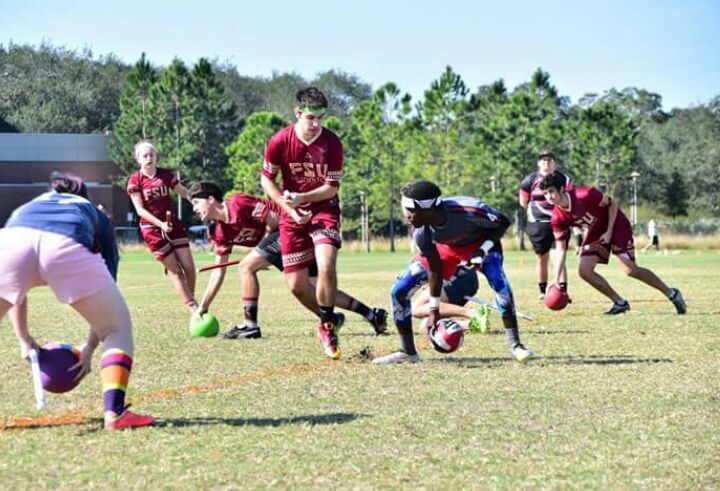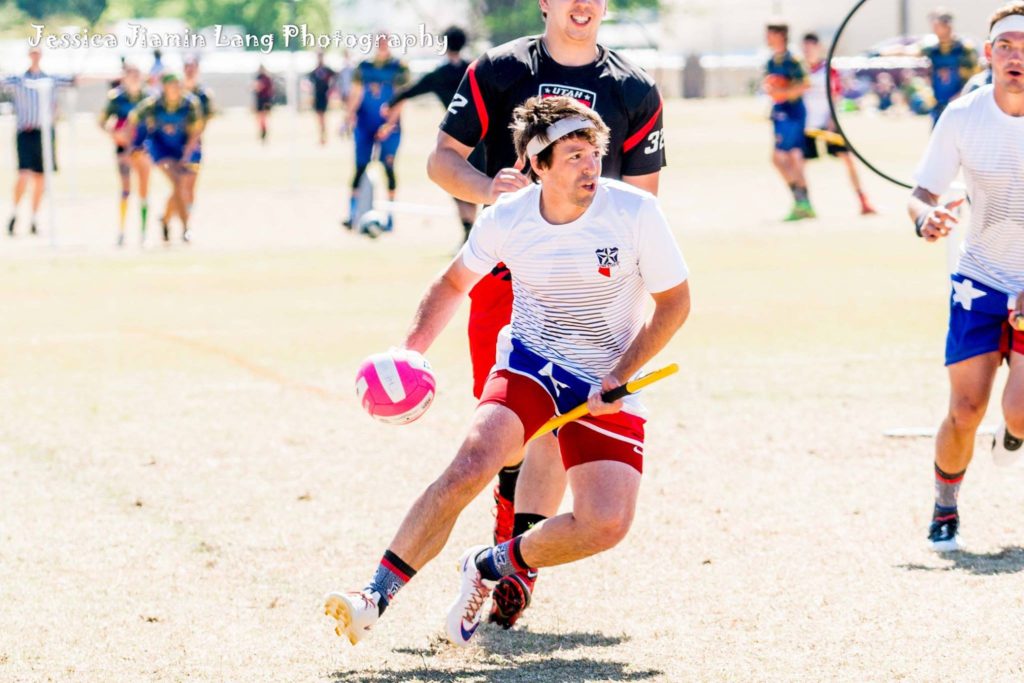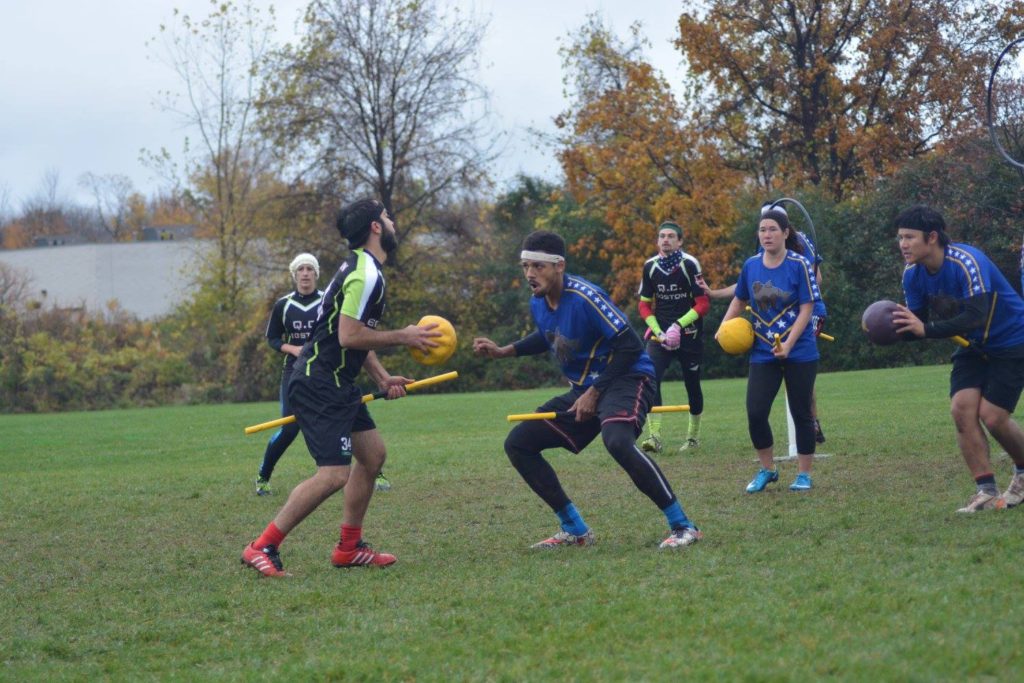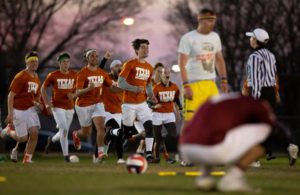- Rule, Britannia, no more?
- Unpopular Opinions: US Quadball Cup 2023
- Proven Contenders: University of Virginia
- Proven Contenders: Rutgers University
- Proven Contenders: University of Michigan
- Proven Contenders: Creighton University
- Different Perspectives: A Look Inside USA Ultimate
- Antwerp QC, Much of Belgian Core, Leaves Competitive Quidditch
The South Regional Got a Bad Case of Roger Goodell Syndrome
- Updated: February 13, 2017

Credit: Andrew Salinero
Last Sunday, the New England Patriots pulled off a sports miracle, rallying from 25 points down two-thirds of the way through the game to defeat the Atlanta Falcons, 34-28, in Super Bowl LI.
There were many potential storylines to draw out of such a historic game. The Patriots won their fifth super bowl since 2002. Tom Brady and Bill Belichick staked their claims as the best quarterback and head coach of all time. Julian Edelman turned years of inconceivable catch karma on its head while basically defying physics in the process. James White didn’t get a truck, then couldn’t be given a truck, then got a truck.
But for fans of the Patriots, one Super Bowl-winning storyline trumps all others: a giant “F*** you!” to NFL Commissioner Roger Goodell. Years of penalties from the league levied on the Patriots for shady dealings culminated in the infamous “Deflategate,” in which Tom Brady allegedly knowingly and purposefully dropped the PSI of the footballs he was using below league standards during an AFC Championship Game in 2015. With minimal hard evidence, the NFL still chose to move forward with a four-game suspension for Brady to begin this past season, along with a loss of draft picks for the Patriots.
While some would argue that the penalties fit the crimes for the Patriots, that isn’t really the complaint of Patriots nation. Rather, it’s that Goodell has consistently come down more severely on the team and its players than he has on other teams and other players in similar situations. For every four-game Brady suspension for deflating a football with iffy evidence, there’s a two-game suspension of former Baltimore Ravens running back Ray Rice for assaulting his girlfriend on video. For every penalty the team received for spying on the New York Jets and recording their practices, there’s the lack of punishments other teams have received for similar procedural cheats such as the New York Giants illegal use of untraceable walkie talkies on the sidelines during a game this season.
The most dangerous thing the governing body of a sport can do is be inconsistent in the handing down of its punishments—always heavy-handed is fine and always lenient is fine, but not a mixed bag—and the Patriots and their fans are arguing that inconsistent is exactly what Roger Goodell has been over the past decade.
Which brings us to yesterday: at the South Regional Championship, Gainesville Siege had secured the No. 4 seed and a bye to the quarterfinals with a 3-1 performance on day one of the tournament. With five bids to US Quidditch Cup 10 available, the team was in a strong position to qualify.
While the team was not due to play until the third time slot of day two, they were required to supply a full, seven-member referee staff during the first time slot. They failed to do so, supplying two members by 9:06 am and three more in the minutes following, according to on-site USQ staff.
USQ’s full policy on the matter is as follows: “Teams are required to submit referee crews to help fill several game slots – more information on scheduling will be provided as the event approaches. If a team does not fulfill their referee obligations or their referees do not show up for their games as assigned, they will be subject to forfeit for all remaining games of the tournament.”
In accordance with that policy, Gainesville Siege was immediately disqualified from the tournament and stripped of an opportunity to qualify for nationals.
“Due to a violation of the team referee crew policies at South Regional Championship, Gainesville Siege has been disqualified from the remainder of the tournament,” said USQ Events Director Mary Kimball in an official statement. “They are forfeited from their originally scheduled 11am game as described in tournament policies here, and as such is forfeited for the remainder of the tournament per USQ forfeit policy.”
One time slot later, University of Central Florida failed to report a full team of seven players to the field by 5 minutes past the scheduled game time due to a car breaking down on the way to the field. As written in their policy, USQ enforced a forfeit on Central Florida for that game, and the University of Miami advanced to the next round.
In a vacuum, nothing about USQ’s treatment of these situations is problematic. They had a clear policy that was definitively violated and brought the penalty that was appropriate. The referee schedule posted for the tournament clearly asked for seven referees. While the situation was extremely unfortunate for the team involved, it was well within reason.
To fully understand the inherent issues in the decision, we have to refer back to Goodell’s rulings against the Patriots. In a vacuum, there is no inherent problem with the severity of the punishments that he handed out. But when compared with the punishments for other parties committing similar violation, the decisions seemed inconsistent.
Most USQ policies can be divided into two categories. One set is largely for show, which is nearly never enforced and acts largely as a deterrent more than anything else. Examples of this would include certain kinds of cheating that are completely unprovable or making sure there is actually a certified EMT at every official game. It’s hard to score the organization for the way they’ve handled these policies, since the breadth of evidence in these cases is so vague.
But there is a division of more concrete categories of policy violations, those simple to prove and straightforward to rule on, and it is these cases that USQ’s decision making has been found wanting.
For two of the most prominent examples, let us take it back to the World Cup VIII season. In the lead up to the Southwest Regional Championship that season, Lone Star Quidditch Club were the nearly unanimous No. 1 in The Eighth Man media rankings, with a 24-1 record and a dominant set of performances over the rest of the sport’s elite. With an incredibly deep roster entering what was to be a highly-competitive field, a championship run at not only the Southwest Regional but also World Cup seemed very much in the cards.
The only issue was they forgot to submit that incredibly deep roster on time.

Credit: Jessica Jiamin Lang
The USQ policy at the time was very clear: if you don’t submit your roster by the deadline, you cannot play in the tournament. Teams had been reminded about the approaching deadline ad nauseum, and Lone Star had made a simple and innocent mistake. Still, the violation was cut-and-dry, and the punishment should have been as well.
“I thought that we should’ve been ‘DQ-ed,’ because that was the set punishment for the rule we broke (even if I didn’t think the punishment was appropriate),” said Mitch Cavender, who was head coach of Lone Star Quidditch Club at the time. “I didn’t know what USQ would ultimately do, however, as they’re historically capricious with enforcement.”
Instead, Lone Star got a free pass. They were allowed to submit their roster late and play in the Southwest Regional without so much as a slap on the wrist. They would go on to win that tournament and make the finals of World Cup VIII, and the entire incident became nothing more than a footnote in the history of the sport.
On day one of that same World Cup tournament, another violation came up that has a lot in common with yesterday’s South Regional incidents. Texas A&M, a young team during the 2014-15 season that was still receiving votes in The Eighth Man rankings, failed to submit a referee crew for an early morning game that came before they needed to play. It sent the referee staff into a frenzy and held up a tournament that was running on an incredibly tight schedule due to the new Swiss format.
Though it was two years ago, the policy was the same as it is now: if you fail to provide a referee crew, you forfeit the rest of the tournament. However, the difference between what happened to Gainesville Siege and what happened to Texas A&M is that nothing happened to A&M. The team continued on in the tournament and everyone looked the other way.
To avoid only using dated references, let’s turn to an example from earlier this season. At the Northeast Regional Championship, there was an understanding in place that teams, once eliminated, would staff the field they were just on with referees to help the tournament keep moving. This policy was followed by teams all weekend, even by those that had just missed out on a bid to US Quidditch Cup 10.
But after Quidditch Club Boston defeated the BosNYan Bearsharks in the semifinals, the Bearsharks refused to stay, putting a massive stress on the system when numbers of people remaining at the tournament were already dwindling and resources were stretched thin. The incident led to nothing short of a breakdown for the volunteer field manager that got pinned in the middle.

Credit: Jodie Greenhouse
While the Bearsharks had no more games that weekend to forfeit, they were still in direct violation of the referee staff policy, which doesn’t specify that you’re only held to those requirements while your team is still in the tournament. Even so much as a slap on the wrist would have been promising for the amount of trouble the Bearsharks caused, but, once again, the team was allowed to walk with no consequences.
It’s important to stress than none of the instances above make the teams involved bad teams or bad people. Each of them have a lot of opinions and needs to balance at any given time, and sometimes it is difficult to balance what your team wants with what your team needs. In fact, you can probably find multiple referee staffing violations at any given regional in any given season—and I would not wish a severe penalty on any of them.
That said, there needs to be consistency with enforcement against these violations. When two teams break equally important policies, they need to be punished the same. Whether that is no punishment, a slap on the wrist or a suspension, it has to be consistent. The bar has now been set by Kimball, who, as the fairly new USQ Events Director, has every right to set it wherever she feels best. But that bar needs to stay right there for as long as she is in control of it. Because for every team not punished exactly the way Gainesville Siege was punished for breaking the same policy, USQ’s case against Siege gets that much weaker.
When it comes to sports policy violations, you can be an authoritarian or you can be a lenient administrator. But as any Patriots fan will tell you, you can’t be a Roger Goodell.



